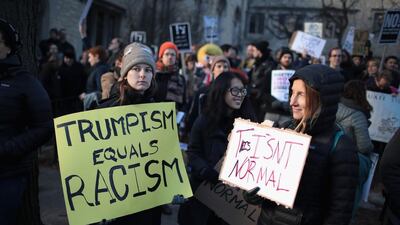Since President Donald Trump’s inauguration on January 20, it’s never been harder to be Arab- or Muslim-American. After an executive order signed on January 27 banned immigration from seven mainly Muslim countries for 90 days, daily protests, even after the ban was overturned by a court order, and warring words between the Trump camp and opponents have put Muslim Americans in the spotlight.
The Seattle-based playwright Yussef El Guindi was born in Egypt and received his undergraduate degree from the American University of Cairo. Now an American citizen, El Guindi has seen his plays about the Arab-American/Muslim-American experience performed across the country for more than a decade. Fusing comedy and politics, El Guindi’s work is particularly relevant these days, though he has yet to see a surge of new interest from theatre producers.
“My impulse, as an immigrant, is to keep my head down and shut up. Immigrants are the people most invested in trying to prove their allegiance and worth to their adopted country. It’s a little distressing to realise that those efforts are effectively discounted in lieu of the much more salient facts (or fictions) of one’s race and religion.
“I do have a voice, though. I imagine I will continue doing what I’m doing: writing and responding to what’s going on around me. While my impulse may be to keep my head down and shut up, that writer’s voice will have none of that. Plus the American citizen in me will have none of that. I believe we are required to speak up during times like these.”
Ali Eteraz, the Pakistan-born, San Francisco-based author of the recent novel Native Believer and the bestselling Muslim coming-of-age memoir,Children of Dust, seems of a similar mind to El Guindi. "In a nation of immigrants, every act of exclusionary nativism should be taken personally," he says.
“A minority writer lives in the shadows,” Eteraz stresses, “in exile from the gardens where the majority writer suns herself. In a time when the sun is erased, the minority writer must teach [himself] how to thrive in the dark.”
Moustafa Bayoumi predicts more dark times ahead, but seems ready to do battle. He is the author of two prescient, award-winning books about Arab-American/Muslim-American life: How Does It Feel to Be a Problem?: Being Young and Arab in America and This Muslim American Life: Dispatches From the War on Terror. Both books underscore Bayoumi's belief that in the United States, Muslims are by default guilty till proven innocent.
Despite the seeming dystopia, Bayoumi appears heartened by all the public solidarity he’s observed over the past few weeks. “I don’t think we would have gotten the stay from the judiciary over the immigration ban, had it not been for all the public protest,” he says.
He doesn’t find the anti-Muslim sentiment to be new, but rather exacerbated under Trump. “In a number of ways this is an extension of the last 15 years, rather than a rupture, so it is hard to keep up with, but it’s been hard to keep up with for 15 years. There is support for Trump’s policies not because of Trump, but because there is a political culture cultivated over these years.
“Of course, Islamophobia is much older than 15 years, but we can point to 9/11 as a moment when things changed on a matter of scale in the United States, and also, when Islamophobia turned inward.
“Prior to 9/11, Islamophobia had an outward-looking foreign-policy element to it, about foreigners out there. After 9/11, Islamophobia turned inward, and we’re seeing that right now. Not to minimise what’s happening today – it feels almost like we’re in an emergency situation, and I think we need to operate along those lines, but by doing so we shouldn’t forget or be nostalgic for some past that didn’t exist. I don’t think Barack Obama was such a huge friend to the Muslims, in the end.”
When asked if today’s anti-Muslim furore is pushing him toward or away from his religion of birth, Bayoumi is expansive.
"I think Muslim identity has actually become more and more racialised. It's become more and more identitarian. Because when it's assumed that you're Muslim, you have to take on that role – that's one of the things Jean-Paul Sartre wrote in his essay Anti-Semite and Jew, that the Jew is someone others think is a Jew.
“I’m not going to run away from that [Muslim] identity; I’m going to embrace it, and then I’m going to get others around me and be open-tent-like about it. I’ve always grown up around religious people, so I find religious Muslims comforting, I don’t find them scary at all.
“And I feel like it’s important to have a wide sense of who we are across the spectrum, so that you don’t just get a few people representing you in a narrow way, because the Muslim community is broad and diverse and complicated.”
Perhaps this diversity will be the salvation for Muslims and Americans living in the age of Trump.
Jordan Elgrably writes on the politics of identity for a range of publications. In 2001, he cofounded the Markaz, the first cultural centre for the Middle East in Southern California.

